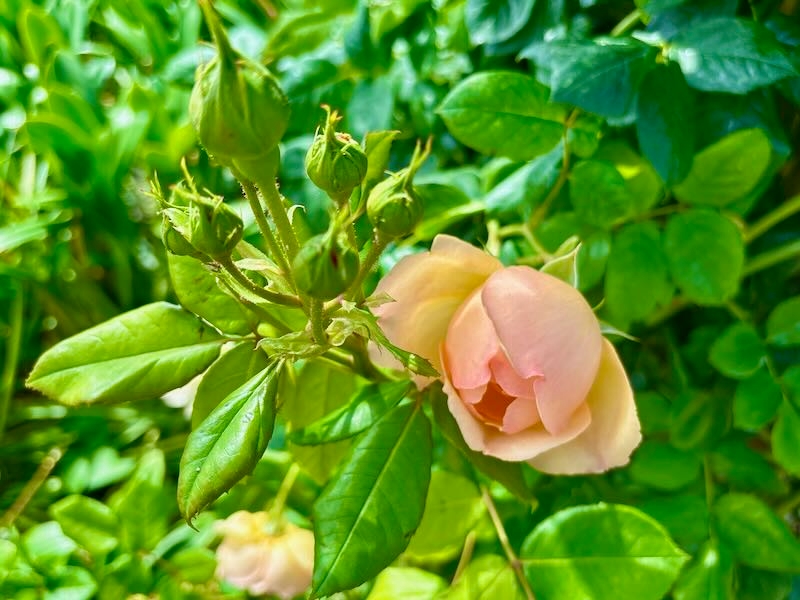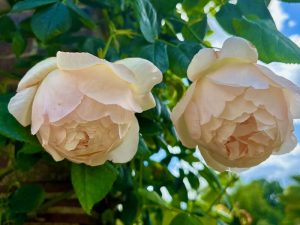Rosa ‘Wollerton Old Hall’: The Elegant English Climbing Rose by David Austin
Rosa ‘Wollerton Old Hall’ is a stunning English climbing rose introduced by the renowned breeder David Austin in 2011. Known also as Ausblanket, this rose captivates gardeners with its strong, warm myrrh fragrance enhanced by bright hints of citrus. Named after one of the UK’s most beautiful private gardens, it combines classic beauty, rich fragrance, and reliable performance for gardeners seeking an elegant climbing rose.
Description of Rosa ‘Wollerton Old Hall’
This rose belongs to the family Rosaceae and is a deciduous perennial climber. It can grow as a climber or shrub, reaching heights between 5 to 12 feet (1.5 to 3.7 meters) with a spread of 3 to 4 feet (0.9 to 1.2 meters). The plant features mid-green, glossy compound leaves with few prickles on its erect, multi-stemmed canes.
The blooms are medium-sized, 3 to 4 inches (7.5 to 10 cm) across, fully double with about 45 petals each. They have a rounded, chalice-shaped form and display a beautiful blend of pale apricot fading to cream or butter-yellow tones as they mature. These solitary flowers appear in late spring through summer and rebloom consistently throughout the season, making it a favorite for continuous color.
One of the most remarkable features of Rosa ‘Wollerton Old Hall’ is its intense fragrance—a warm, rich myrrh scent with fresh citrus undertones that makes it a sensory delight in any garden.
Growth Habit and Landscape Use
‘Wollerton Old Hall’ grows with a medium growth rate and can be trained as a climber on walls, fences, arches, or arbors. Without support, it forms a lovely upright shrub, making it versatile for many garden settings. Its elegant blooms and fragrance fit perfectly into English, cottage, and cutting gardens.
Due to its height and spread, it works well as a vertical accent or barrier. It is ideal for mass planting, borders, or as a striking specimen plant. This rose thrives in USDA Hardiness Zones 5 through 11, allowing cultivation in a broad range of climates.
How to Grow Rosa ‘Wollerton Old Hall’
Light
Plant Rosa ‘Wollerton Old Hall’ in full sun where it receives at least 6 to 8 hours of direct sunlight daily. This exposure ensures vigorous growth and abundant flowering. In hotter climates, afternoon shade can help prevent leaf scorch and reduce plant stress.
Soil
Choose fertile, moist, well-drained soil rich in organic matter. Loam soils with a slightly acidic to neutral pH of 6.0 to 7.0 suit this rose best. Avoid planting in areas previously occupied by roses to reduce disease risk. If your soil is heavy clay or sandy, improve its structure by adding compost or well-rotted manure before planting.
Watering
Water your rose regularly, especially during dry spells and warm weather. For newly planted roses, water every 2 to 3 days, gradually reducing to once a week for established plants. Deep watering encourages strong root development. Avoid overhead watering to limit fungal diseases like powdery mildew. Check soil moisture about 2 inches (5 cm) below the surface and water when dry.
Fertilizing
Feed Rosa ‘Wollerton Old Hall’ with a balanced fertilizer (such as 10-10-10 NPK) or organic compost in early spring to stimulate new growth. Repeat fertilization mid-summer to maintain vigor and promote blooming. Apply fertilizer evenly around the base of the plant, keeping it away from direct contact with stems to avoid burning.
Pruning and Training
Prune in late winter or early spring while the plant is dormant. For climbing forms, train the main canes horizontally along trellises, fences, or arbors to encourage more flowers along the stems. Remove leggy side shoots, cutting back to 3-4 bud spurs to maintain shape and encourage flowering. Deadhead spent blooms throughout the growing season to promote continual flowering. Remove any dead, diseased, or crossing stems to improve air circulation and plant health. Occasionally, rejuvenate the rose by cutting back old canes to the base to encourage fresh growth.
Support
Provide sturdy support such as a trellis, arch, wall, or fence for the rose to climb. Guide young shoots to the structure, and they will naturally twine and climb, creating a beautiful vertical display.
Pest and Disease Management
Maintaining good air circulation and avoiding overhead watering helps prevent many fungal diseases. Monitor for common rose pests:
- Aphids: Remove by spraying with insecticidal soap or water.
- Spider mites: Increase humidity or apply miticides if infestation is severe.
- Japanese beetles: Hand-pick or use traps to control populations.
Watch closely for black spot and powdery mildew, which can affect roses. Remove infected leaves promptly and treat severe outbreaks with fungicides or organic remedies such as neem oil.
Winter Protection for Rosa ‘Wollerton Old Hall’
In colder zones, protect Rosa ‘Wollerton Old Hall’ by applying 2 to 3 inches (5 to 7.5 cm) of organic mulch around the base to insulate roots and retain moisture. Use frost cloths or burlap wraps to shield canes from freezing temperatures and harsh winds.
Landscape and Design Uses
‘Wollerton Old Hall’ fits beautifully in vertical garden spaces, cottage gardens, and classic English garden themes. Its elegant apricot-to-cream blooms and intoxicating fragrance make it ideal for cutting gardens, borders, and as a natural privacy screen or barrier. The rose’s medium size and repeat blooming habit provide gardeners with reliable floral displays from spring through fall.
Conclusion
Rosa ‘Wollerton Old Hall’ is a medium-sized, fragrant English climbing rose that offers gardeners a blend of beauty, fragrance, and versatility. Its strong myrrh and citrus scent, combined with creamy apricot blooms and glossy green foliage, make it a standout choice for vertical garden features or shrub borders. With proper planting, watering, fertilizing, and pruning, this rose will reward gardeners with long-lasting, repeat blooms and robust growth in a wide range of climates. Whether trained on a trellis or allowed to flourish as a shrub, ‘Wollerton Old Hall’ brings classic charm and delightful fragrance to any garden.



